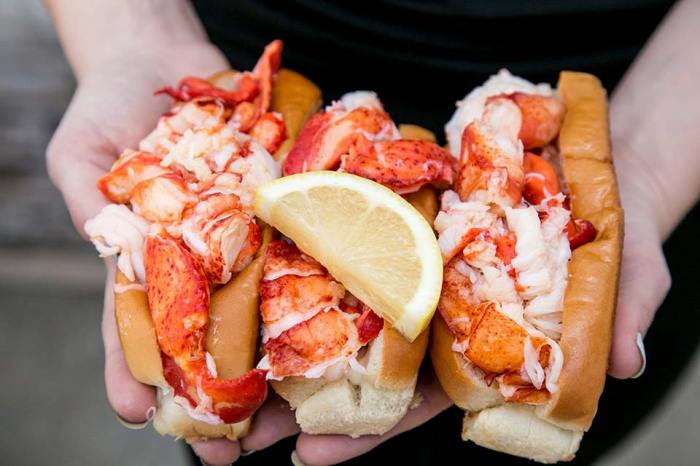Nutritional Composition of Maine Lobster

Cousins maine lobster nutrition facts – Dive into the delicious world of Maine lobster, where culinary delight meets nutritional powerhouse! We’ve already covered the basics, so let’s get down to the nitty-gritty of what makes this crustacean a nutritional champion. Prepare to be amazed by the impressive nutritional profile of this succulent seafood.
Macronutrient Breakdown of Cooked Maine Lobster Meat
Maine lobster is a lean protein source, boasting a surprisingly low fat content, making it a welcome addition to many diets. The following table details the macronutrient composition per 100g of cooked lobster meat. Remember, these values are approximate and can vary slightly depending on the lobster’s size and preparation method.
Cousins Maine Lobster’s nutritional profile boasts succulent seafood delights, but if you’re craving a hearty, land-based option, consider the creamy comfort of Panera’s Broccoli Cheddar Soup; you can find the complete nutrition facts for panera broccoli cheddar soup here: nutrition facts for panera broccoli cheddar soup. Returning to the ocean’s bounty, remember that Cousins Maine Lobster offers a range of nutritional information depending on your chosen lobster preparation, allowing you to make informed choices about your seafood feast.
| Nutrient | Amount | Unit | % Daily Value* |
|---|---|---|---|
| Protein | 28 | grams | ~56% |
| Fat | 1 | grams | ~2% |
| Carbohydrates | 0 | grams | 0% |
*Percent Daily Values are based on a 2,000 calorie diet. Your daily values may be higher or lower depending on your calorie needs.
Vitamin and Mineral Content of Maine Lobster Meat
Beyond the macronutrients, Maine lobster is a treasure trove of essential vitamins and minerals. These contribute to overall health and well-being, making lobster more than just a delicious treat.
Maine lobster is particularly rich in:
- Vitamin B12: Crucial for nerve function and red blood cell formation. A 100g serving provides a significant portion of your daily needs.
- Selenium: A powerful antioxidant that protects cells from damage. Selenium contributes to a healthy immune system and thyroid function.
- Zinc: Essential for immune function, wound healing, and cell growth. Lobster provides a decent amount of this important mineral.
- Other vitamins and minerals present in smaller, yet still beneficial, amounts include copper, manganese, and phosphorus.
Omega-3 Fatty Acids in Maine Lobster and Their Health Benefits, Cousins maine lobster nutrition facts
While low in overall fat, Maine lobster contains beneficial omega-3 fatty acids, particularly EPA and DHA. These aren’t present in massive quantities like in fatty fish like salmon, but they still contribute to the overall health profile.
Omega-3 fatty acids are known for their anti-inflammatory properties and their positive effects on heart health, brain function, and reducing the risk of certain chronic diseases. Including lobster in your diet, alongside other sources of omega-3s, contributes to a well-rounded approach to healthy eating.
Nutritional Comparison with Other Seafood: Cousins Maine Lobster Nutrition Facts

So, you’ve decided to delve into the delicious world of Maine lobster, but are you wondering how it stacks up against other seafood superstars? Let’s pit the crustacean king against some worthy contenders in a nutritional showdown! We’ll explore the protein, fat, and calorie content to help you make informed choices about your seafood selections.
Maine lobster, with its succulent meat and delicate flavor, often commands a premium price. But is it worth the splurge from a nutritional perspective? Comparing it to other popular seafood choices like shrimp, crab, and salmon allows us to see where it shines and where it might fall a bit short.
Nutritional Comparison Table
The following table provides a general comparison of nutritional values per 100g serving. Remember that exact values can vary depending on the specific type of seafood, preparation method, and size.
| Seafood | Protein (g) | Fat (g) | Calories |
|---|---|---|---|
| Maine Lobster | 28 | 1 | 120 |
| Shrimp | 24 | 1 | 100 |
| Crab (Dungeness) | 20 | 2 | 90 |
| Salmon (Atlantic) | 20 | 13 | 200 |
Note: These values are approximate averages and can vary based on several factors.
Advantages and Disadvantages of Choosing Maine Lobster
From the table, it’s clear that Maine lobster boasts a high protein content, making it an excellent choice for those focusing on muscle building or maintenance. Its relatively low fat content is also appealing to health-conscious individuals. However, compared to shrimp and crab, it’s slightly higher in calories. Salmon, on the other hand, offers a significant boost in healthy fats (omega-3s), which are crucial for heart health and brain function, but at the cost of higher calories and fat.
Potential Health Impacts of Regular Consumption
Regular consumption of Maine lobster, like other seafood, offers several potential health benefits. Its high protein content supports various bodily functions, while the low fat content contributes to a healthy weight management strategy. However, it’s crucial to remember that moderation is key. Overconsumption of any food, including lobster, can lead to excessive calorie intake. The potential benefits of the omega-3 fatty acids found in salmon, absent in significant amounts in lobster, should also be considered.
A balanced diet incorporating a variety of seafood, fruits, vegetables, and whole grains is always the best approach for optimal health.
FAQ Section
Are there any potential contaminants in Maine lobster?
Like all seafood, Maine lobster can contain trace amounts of environmental contaminants. However, regulatory bodies monitor levels to ensure safety for consumption.
How does the nutritional value of Maine lobster change during cooking?
Cooking methods can slightly alter the nutritional composition. Boiling or steaming generally results in minimal nutrient loss compared to frying.
Is Maine lobster suitable for people with high cholesterol?
Maine lobster is relatively low in saturated fat, but individuals with high cholesterol should still consume it in moderation as part of a balanced diet.
What are the best ways to store cooked Maine lobster?
Cooked Maine lobster should be refrigerated promptly and consumed within a few days. Freezing is also an option for longer-term storage.
